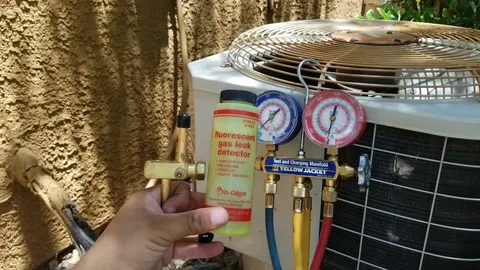How Freon Leak Detection Can Save Your Air Conditioner?

If your air conditioner is blowing warm air, struggling to cool the house, or running longer than usual, the culprit could be a Freon leak. Freon, the refrigerant in many older A/C systems, is essential to the cooling process. When it leaks, your system not only loses its ability to cool but can also become hazardous to your health and the environment.
At P & J Air Conditioning LLC, we’ve seen firsthand how small refrigerant leaks can lead to big problems. In this guide, we’ll cover how to spot the signs of a Freon leak, what causes them, and what steps you should take if your system is affected.
What Is Freon and Why Is It Important?
Freon is a type of refrigerant that absorbs heat from inside your home and releases it outside. This cycle allows your air conditioner to cool the air you breathe. If your system loses Freon, it can no longer cool efficiently—and that's where professional Freon Leak Detection & Repair becomes essential.
- It can’t cool properly
- The compressor may overheat
- Your energy bills increase
- The system is more likely to break down
Leaks don’t just affect performance—they also pose risks to your indoor air quality and the environment. Freon is a chemical compound and should never be inhaled.
Common Signs of a Freon Leak
Detecting a refrigerant leak early can prevent costly repairs and safety risks. Look for these warning signs:
1. Warm Air from Vents
If your AC is running but not cooling, low refrigerant could be the issue.
2. Hissing or Bubbling Sounds
This often indicates a leak in the refrigerant line.
3. Frozen Evaporator Coils
Low refrigerant causes moisture on the coils to freeze.
4. Longer Cooling Cycles
Your AC may take much longer to cool the same space.
5. Unusual Odors
Chemical smells around the unit may suggest a leak.
What Causes a Freon Leak?
Freon leaks are typically caused by:
- Corrosion of copper refrigerant lines
- Physical damage to coils or joints
- Factory defects or poor manufacturing
- Improper installation or previous repairs
- Wear and tear over years of use
Older units (especially those over 10 years old) are more prone to leaks due to material degradation.
How Technicians Detect Freon Leaks
Professionals use several methods to confirm and locate a Freon leak:
- Electronic Leak Detectors: Highly sensitive tools that sense refrigerant vapors.
- Ultraviolet Dye: Injected into the system and revealed with a UV light.
- Soap Bubble Test: Sprayed on connections to reveal leaks by bubbling.
- Pressure Testing: Measures drops in pressure to locate leaks internally.
Once identified, the technician can determine whether the leak is repairable or if a component needs replacing.
Why You Shouldn’t Just “Top Off” Freon
Many homeowners are tempted to simply add more refrigerant—but this is only a temporary fix. Unless the source of the leak is repaired:
- The refrigerant will leak again
- Cooling issues will return
- You may damage your compressor
- You’ll waste money on repeated service calls
A qualified technician will repair the leak first and then recharge the system.
Is Freon Still Legal? What You Need to Know
Older air conditioners often use R-22 Freon, which has been phased out due to its environmental impact. If your system still runs on R-22:
- It may be difficult or expensive to find refrigerant
- Repairs can cost more
- Replacement with a newer system may be the better investment
New systems use more eco-friendly refrigerants like R-410A, which are more efficient and widely available.
Repair or Replace? Making the Right Call
If your AC system is more than 10–15 years old and has a refrigerant leak, it might make more financial sense to replace it. A new energy-efficient model:
- Reduces energy costs
- Uses safer refrigerants
- Comes with warranties
- Offers better cooling and comfort
That said, newer systems with minor leaks can often be successfully repaired at a reasonable cost.
Conclusion
Freon leaks may start small, but they can cause major discomfort and costly damage if ignored. The good news? With professional Freon leak detection, you can find and fix issues before your system fails.
Don’t take chances with your home’s comfort or air quality. Whether you need a quick repair, a full leak inspection, or advice on upgrading your system, the certified technicians at P & J Air Conditioning LLC are here to help you stay safe, cool, and confident all year long.
FAQs About Freon Leak Detection
1. Is a Freon leak dangerous?
Yes, Freon is a chemical refrigerant. Leaks can harm your health, damage the ozone layer, and lead to AC failure.
2. Can I detect a Freon leak myself?
Some signs are visible (ice on coils, poor cooling), but proper leak detection requires tools and expertise. Always call a professional.
3. How much does Freon leak repair cost?
Depending on the location and severity, repair costs range from $200 to $1,500, especially if coil replacement is needed.
4. Can I keep using my AC if it has a leak?
Running your system with a leak can damage the compressor and lead to higher energy bills. It’s best to shut it off and call a technician.
5. Will insurance cover Freon leak repairs?
Typically, no—most home insurance policies do not cover wear-and-tear HVAC issues. However, a home warranty might.
- Information Technology
- Office Equipment and Supplies
- Cars and Trucks
- Persons
- Books and Authors
- Tutorials
- Art
- Causes
- Crafts
- Dance
- Drinks
- Film
- Fitness
- Food
- Spiele
- Gardening
- Health
- Startseite
- Literature
- Music
- Networking
- Andere
- Party
- Religion
- Shopping
- Sports
- Theater
- Wellness



